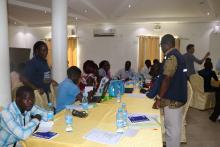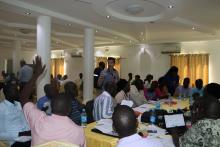South Sudan set to vaccinate targeted healthcare and frontline workers operating in high risk states against Ebola
Juba 8 December, 2018 – The Ministry of Health of the Republic of South Sudan with support from the World Health Organization (WHO), DFID, GAVI vaccine alliance and other partners, is set to vaccinate targeted healthcare and frontline workers operating in high risk states bordering the Democratic Republic of Congo (DRC) against Ebola virus disease (EVD) as part of national preparedness efforts.
To facilitate the process, a training for the Vaccination team was incorporated into the micro plan developed by the vaccine technical working group (TWG). The members of the TWG among others include MoH, UNICEF, CDC, WHO, MSF, Health Cluster and others. Accordingly, a four days training for 60 participants drawn from the states of Juba, Yei, Yambio and Nimule on Good Clinical Practice (GCP) course (4-7 December, 2018) in Juba.
The vaccination team members selected by their respective State Ministry of Health included representatives from health facilities, private sector and Civil Society Organizations. Each state vaccination team comprised of 15 members including vaccinators, clinicians, social mobilizers, and logisticians.
The GCP training is mandatory prior to the administration of the vaccine. Participants were equipped with knowledge and skills on Ebola vaccine (rVSV-ZEBOV) administration including vaccination techniques, and exposed through a simulation exercise.
Through this training, the vaccination team members were GCP certified and are now ready to conduct the Ebola vaccination scheduled to start with Juba on 19 December, 2018, and follow up the vaccinated individuals for a period of 21 days as the minimum standard of care.
The Ministry of Health, with technical support from the Vaccine Technical Working Group of the National EVD Task Force, the states, and NGOs operating in health care facilities in the respective States will coordinate the administration of the Ebola vaccine.
With support from GAVI vaccine alliance, 2,160 doses of the Ebola vaccine (rVSV-ZEBOV) have been allocated to South Sudan and will be administered to protect against Ebola virus-Zaire, the strain that is confirmed in the current outbreak in DRC. Although this vaccine is not yet licensed, it is being used under the compassionate-use guidelines in response to the ongoing Ebola outbreak in DRC as recommended by the WHO’s Strategic Advisory Group of Experts on Immunization (SAGE).
Dr Antony Laku, the Manager of the Expanded Program on Immunization (EPI) at the Ministry of Health, appreciated the technical and logistical support which has made this intervention possible. He appealed to the targeted health workforce to comply, consent and get vaccinated to protect themselves and mitigate the risk of possible EVD infection.
Dr Rachel Seruyange, EPI Technical Officer Universal Immunization at the WHO country office, noted that vaccination of healthcare and frontline workers at high risk is a safe and cost-effective strategy for preventing the spread of Ebola disease. She reiterated WHO’s commitment to ensure compliance with the standards during the vaccination exercise.
Some priority pre-Ebola vaccination activities being implemented include but not limited to cold chain equipment installation and logistics management, mapping of health facilities, healthcare and frontline workers; and development of the social mobilization messages and educational materials for the vaccination.
South Sudan is one of the three countries neighbouring DRC at very high risk of possible Ebola virus disease importation. The country is on high alert and no confirmed case has been detected as of 8 December, 2018.
The implementation of the EVD preparedness contingency plan in high risk areas with support from partners continues. These include entry screening of travellers at selected points of entry; health facility and community-based EVD surveillance; risk communication, and community engagement. Capacity for infection prevention and control, case management, and for safe and dignified burials is also being enhanced.
Email: seruyanger [at] who.int
Tel: +211921702124
Communication Officer (Health Promotion/Risk Communication focal person)
Mobile: +211 (0) 921647860
Email: luwagal [at] who.int


